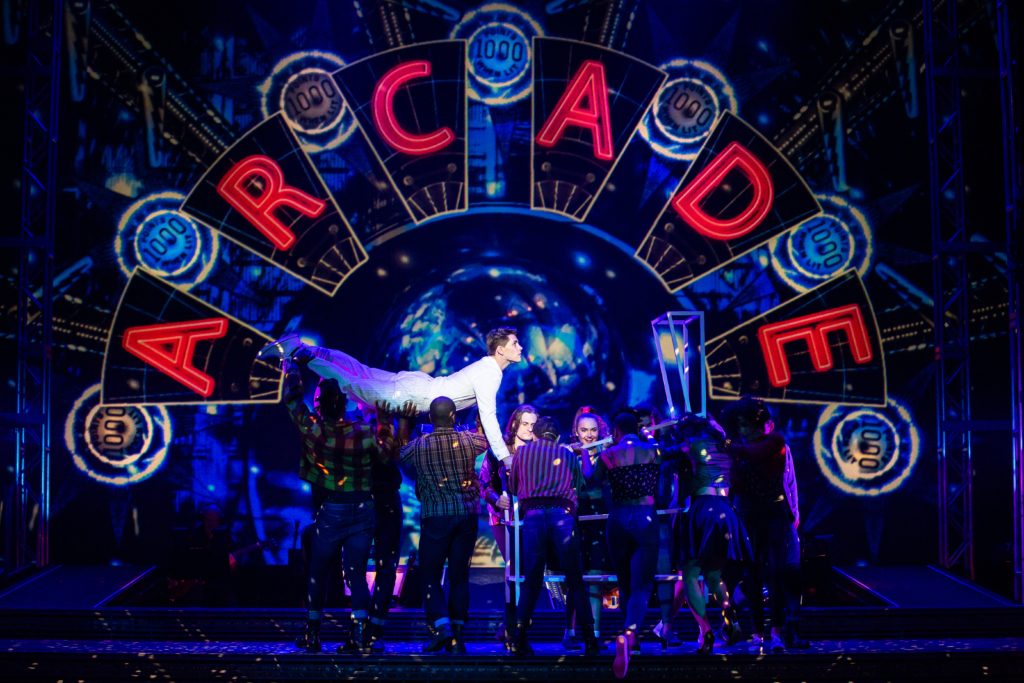After two solid seasons, it’s established that the Kennedy Center’s Broadway Center Stage series is a major component of the Baltimore/DC theatrical landscape. Acquiring first rate Broadway and Hollywood talent in intensely-assembled one week runs of home-grown musicals in “concert” form that frankly rival and even exceed many current national touring productions has brought unique, exciting new possibilities for musical theatre to our region. They have given us superior mountings of classics like How to Succeed in Business Without Really Trying and The Music Man. They have blessed us with a redefining new production of cult classic Little Shop of Horrors. For their final offering of this season, they have successfully taken on their most difficult piece yet, The Who’s legendary rock opera Tommy, brilliantly directed and choreographed by Josh Rhodes, and outdone themselves with their best effort to date. With music by Pete Townshend and lyrics by Townshend and original Broadway director Des McAnuff, with additional music and lyrics by John Entwistle and Keith Moon, this 1993 stage version based on the classic 1969 album tightens the story and makes it more linear and literal, yet without losing any of the rock and roll edge of the original source.
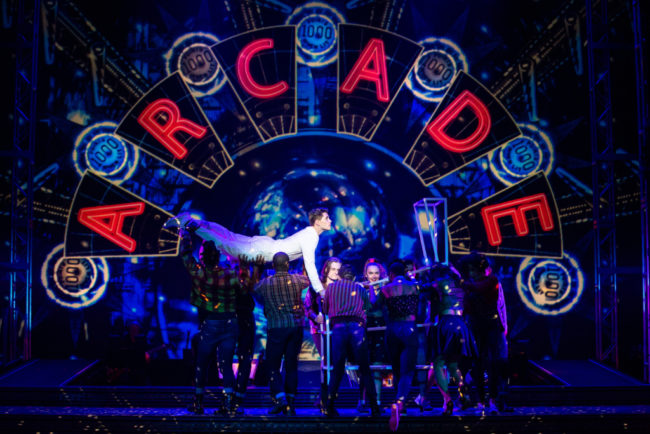
Jeremy Daniel.
The story of Tommy is potentially convoluted and confusing. For a lesson in how not to tell it, revisit Ken Russell’s over-the-top, acid-drenched 1975 movie version, a two-hour campy trip that favored bizarre and outrageous visuals over the characters and the heart. By the time Ann-Margret’s Mrs. Walker is swimming in a Busby Berkly-esque bed full of baked beans (don’t ask, you just have to experience it), the viewer just scratches their head as the film comes to a bizarre, slow-boil, anti-climactic close. If you’ve seen the movie and have concerns, relax. As expected in this superlative series, Director Rhodes weaves a taut, tightly-paced, visually stunning adventure through the traumatized childhood of the title character with a touch of social commentary on the nature of celebrity that is arguably even more relevant today.
In a speed-through back-story prologue set to the Overture, in pre-WWII 1940 England, we experience the whirlwind meeting, courtship, and wedding of Capt. & Mrs. Walker (Christian Borle and Mandy Gonzalez). Once war breaks out, the young captain is called to duty leaving his newly pregnant bride home in the care of his oddball brother Ernie (Manu Narayan). Captured in the line of duty and presumed dead, Capt. Walker is rescued from a POW interment 5 years later and returns home on his wife’s 21st birthday, shocked to find she has moved on and is involved with a new man. In the ensuing confusion and emotional upheaval, the lover gets aggressive with Walker. When a fight breaks out, 4-year-old son Tommy (Declan Fennell), placed in a corner out of the line of confrontation, witnesses his father shoot his rival via a mirror. In a desperate attempt to cover up the murder as self-defense, Tommy’s parents violently shake him and passionately instruct him, “You didn’t see it, you didn’t hear it, you won’t say nothing to no one ever in your life”—words they will soon regret. Tommy’s traumatized child psyche takes those commands to heart and he becomes immediately deaf, dumb, and blind to the point of catatonia.
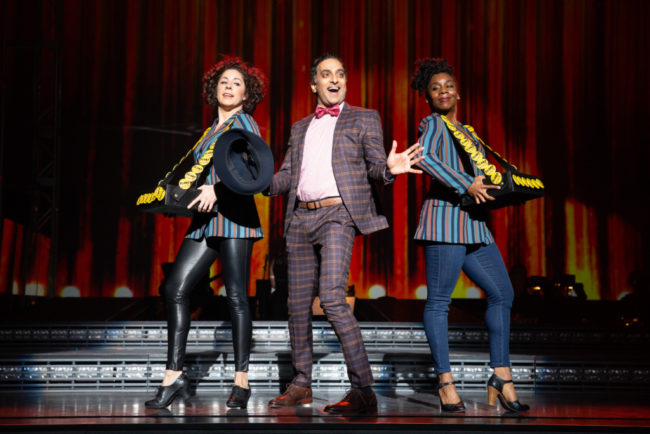
The story from there involves little more than a series of every medical test and treatment possible, as well as continued physical, emotional, and sexual abuse from shady extended family members and mates. There is a minor breakthrough however when, left in the questionable care of his twisted Cousin Kevin (Wesley Taylor), 10-year-old Tommy (Hudson Loverro) encounters a pinball machine at the teen youth center which provides the first degree of physical stimulation to draw him out of his catatonic shell since the incident. He plays strictly by instinct and responds only to the bells, whistles, and lights of the god-like machine. Kevin and his mates label Tommy “the Pinball Wizard”, and, as the classic lyrics reiterate, “that deaf, dumb, and blind kid sure plays a mean pinball!” He quickly becomes a sensation and local celebrity. When 19-year-old Tommy (Riverdale‘s Casey Cott) eventually reintegrates his fractured personality, Tommy becomes a rock star whose music teaches the lessons he learned during his internalized life and transformation. But as Tommy gets more famous, he falls prey to usurping marketers (including his ever-opportunistic Uncle Ernie), and his fans become more passionate and cultish. His successful world tour continues in this dual spiral of lost control until a near tragedy occurs. When a devoted fangirl, Sally Simpson (Taylor Iman Jones), is injured in a security brawl, Tommy calls an end to it all. The lesson for his fans is the delicate core of celebrity—be careful what you wish for. He cautions his fans that while they emulated him for his talent and fame, wanting to be just like him, all the while he was trapped inside his mental prison, only wanting to be normal like them.
As the Walkers, two-time Tony winner Borle (Something Rotten!, Peter & the Starcatcher) and Gonzalez (In The Heights, Wicked) are the veteran talent that anchors the story and the show. Both are strong and commanding with compelling solos (Borle emotional and frustrated in “Christmas”, Gonzalez breathtaking at her wits end in the frantic “Smash the Mirror”), but it’s when they join in duet that they rise together to excel. Their voices blend masterfully on the tight pop/rock harmonies from the critical scene of “What About The Boy” to the powerful “I Believe My Own Eyes”, one of the most underrated duets in the modern Broadway canon.
The trio of actors embodying the title role are likewise strong presences individually and even more impressive as a unit (all three blending beautifully in the “See Me, Feel Me” vocal segments). Local youngster Fennell as Tommy at 4 has a pure voice and heartbreaking pathos. Young Loverro as his 10-year-old counterpart has already shown he can rock with the big boys in his Broadway appearances in School of Rock and as the show-stopping 9-year-old protagonist of A Bronx Tale, but here he accomplishes something way more difficult–being the emotional core of the first act while being a sensory dishrag. With no words or movement other than how others manipulate him, he tugs the audience’s heartstrings with his exacting physical presence.
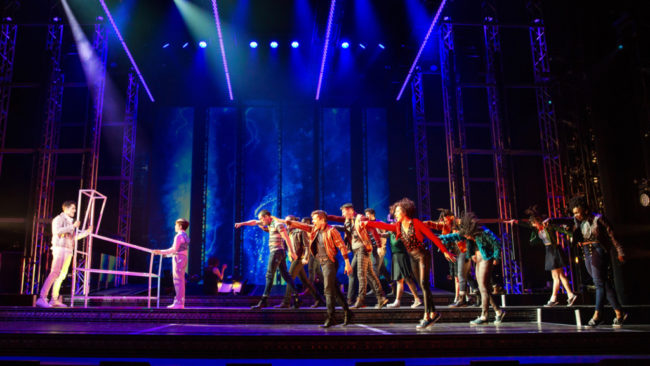
But the revelation of the evening is the dashing Cott. After years of being in the shadow of his older brother Corey (Newsies, Bandstand) theatrically, and of the revised red-headed, buffed-up hunk Archie Andrews in the Riverdale universe, Casey Cott has arrived, and he is a full-on rock star. With boy band good looks, a solid rock tenor (which he negotiates with ease), and an engaging, sexy swagger, Cott musically and physically weaves all the themes and stories together as our key to Tommy’s tortured soul. Cott is without a doubt the titular “Sensation” he sings of, and this thrilling performance could just be the impetus for his career to explode.
The supporting players are all equally valuable in their difficult roles. Narayan’s disturbed Uncle Ernie, a man who’s drinking problem stems from a life in the shadow of his golden boy brother, has one of the oddest roles in musical history. He is called upon throughout to deliver comic support, which he aptly does, while his big solo, “Fiddle About”, involves molesting his defenseless nephew. With the aid of Rhodes’ tasteful staging, he walks that tenuous line effectively, being creepy with just the right touch of discomfort in the disturbing scene, but not so offensive we can’t laugh with him the rest of the show.
Taylor (Spongebob Squarepants, The Addams Family) is darkly hilarious as Tommy’s deliciously demented Cousin Kevin who, again under Rhodes’ tight direction, turns physical abuse into great dark comedy in his namesake solo. Taylor later shows off his rock and roll goods in the extravagantly staged, quintessential number of the show “Pinball Wizard”.
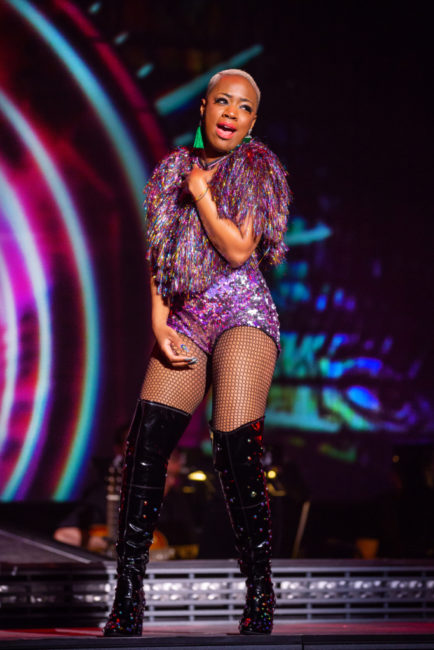
Kimberly Nichole from season 8 of The Voice momentarily stops the show with her spotlight moment channeling Tina Turner’s iconic performance as The Gypsy in possibly the show’s most uncomfortable moment (after an act that has already encompassed virtually every type of child abuse on record?!). Capt. Walker, depleted from his unsuccessful attempts to cure his son, desperately takes the advice of a shady street Hawker who claims he has a girl that works for him whose sensual powers can heal all. He takes his 10-year-old son to the prostitute in hopes of eliciting some response from him. He comes to his senses, however not before Nichole whips up a frenzy of fiery vocals in “Acid Queen” (deserving credit for saluting just enough of Miss Turner without resorting to an impression; this showcase number is all hers), tempered with some sex and drugs, and whisks the boy away before anything more traumatizing happens. #FatherOfTheYear
As has come to be expected of this series, the ensemble is fantastic. Musically solid and nonstop dancing with Rhodes’ visually stunning choreography, they are a solid unit but also ease in and out of minor roles fluidly and make the most of their individual moments, most notably Rory Donovan (King Kong) as Mrs. Walker’s jealous Lover, Mykal Kilgore (Motown) as the sleazy street Hawker, and Jones (Head Over Heels) as a sweet yet persistent Sally Simpson. As perfect as the leads are, this ensemble is the musical force who produce the glorious rock sound required of Townshend’s demanding score.
Once again, even though the production team is officially operating both in concept and execution of the show under the “concert” blanket, expect no scaling back in visuals. Technically, Paul dePoo has outdone himself in visually story telling with a simple set of boxed out mirrored units that serve as doors, furniture, and stage dressing (all that was basically utilized on Broadway), but the background projections here exceed all his previous exemplary work with his most elaborate to date. They form a mobile backdrop, sometimes changing every 8 bars of music. They take us from reality in the rapid-fire WWII prologue to hypnotic inside the mind of Tommy. They soar to the extravagant with an inspired pinball montage that starts with the giant silver ball descending inside its tunnel. And just when you think he’s given all he has, he ups the game for one final blast fleshing out Tommy’s World Tour. This creative genius is what makes this concert series a notch above all others, even those other higher profile series in New York who could take a note or thirty from this season.
Jack deGroot gives a strong assist with an amazing varied lighting plot that takes us from wartime to Christmas to ominous home life to pinball machine to megawatt rock concert, changing as fast as dePoo’s projections. These two technical wizards share rock god status of the evening, but their vision is given ample support from Kai Harada’s usual flawless sound, which is perhaps more critical than ever here.
Tommy is not a costume vehicle, but designer Andrea Hood takes a novel approach and gives the iconic characters welcome new looks. The only questionable decision was appropriately changing looks for the ensemble and most characters over time (Cott in particular gets a nice progression that defines his character while showing off his physique) but leaving leading lady Gonzalez in a single house dress over the years. Sweeping from 1940 to the early 60’s, the timeframe encompasses one of the most dramatic periods of change for women’s fashion in history. Even Borle has three changes, from military to dress suit to casual, yet Gonzalez inexplicably wears the same plaid housedress from curtain (1940) to curtain (adding a sweater in 1963). One change per decade would have been a nice touch.
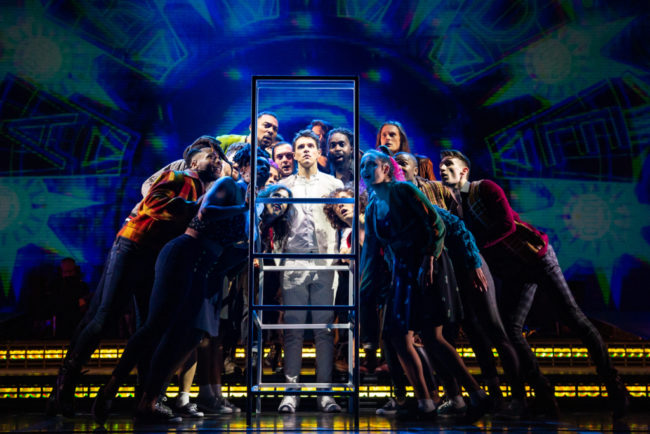
Any review of this superior production would be remiss not to mention the superb music direction by Lynne Shankel and the flawless performance by her rock guitar heavy band recreating Townsend’s musical opus. The heart of this entire musical lies in the genius of The Who’s iconic score, and while not exactly in the wheelhouse of the NSO, Shankel and company truly rock out to do Townshend justice.
As usual, the only regret of this production is the fact that it runs a mere five more performances. This stellar show deserves a limited Broadway run, or better, to be taped for prosperity and shown on PBS or limited theatre release, to reach a larger audience as it deserves, But that not being the case, don’t be the one who didn’t see it or didn’t hear it. This Tommy is, in truth, a Sensation.
Running Time: Approximately 2 hours with one intermission
The Who’s Tommy currently plays through April 29, 2019, as a part of the Broadway Center Stage Concert Series in the Eisenhower Theatre at the John F. Kennedy Center for the Performing Arts, 2700 F Street NW, Washington, DC. For tickets call the box office at (202) 467-4600 or purchase them online.

